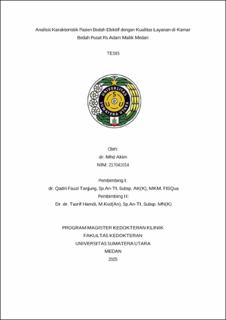| dc.description.abstract | Introduction: Elective surgery is a planned medical procedure requiring optimal
coordination from the preoperative to postoperative phases. As a national referral
hospital, H. Adam Malik General Hospital in Medan handles a high volume of
elective procedures, making service quality evaluation essential. This study aimed
to describe patient characteristics and service quality in the hospital's central
operating room.
Methods: A descriptive quantitative study with a cross-sectional approach was
conducted, involving 580 patients undergoing elective surgery. Data were collected
from medical records and analyzed using SPSS.
Results: Most patients were aged 18–40 years (48.8%), with a mean age of 40.5 ±
22.42 years. Females accounted for 53.8% of the sample, and the majority were
classified as ASA III (44.7%). Pain was the most common surgical indication
(45.9%), and orthopedic surgery was the most frequently performed procedure
(24%). The average body mass index was 22.44 ± 4.38. Abnormal
electrocardiogram findings were observed in 53.3% of patients, while 40% had
abnormal chest X-rays. General anesthesia was administered in 86.2% of cases.
Most surgeries occurred between 06:01 and 12:00 (69.8%), with an average
duration of 128.17 ± 126.90 minutes. A mismatch between operator arrival time
and incision time occurred in 69.3% of cases. The average postoperative pain score
was 3.47 ± 0.811, with NSAID-paracetamol combinations being the most common
analgesic regimen.
Conclusion: Overall, 70.3% of patients rated the service quality as good. However,
improvements in operative time efficiency and team coordination are needed.
Strengthening surgical scheduling management, team training, and perioperative
protocol optimization are recommended. | en_US |


